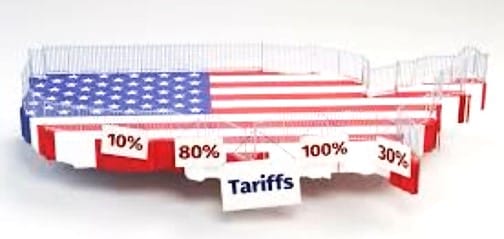
Have you ever heard anyone speak of “free trade?” The premise and practice is very important to Americans.
How? Our jobs, wages, and economy all depend upon the purchase of the goods and services produced and delivered by hard-working Americans. Likewise, the economies of even the most tyrannical and dictatorial countries are dependent upon the purchases made by US citizens who serve as the largest buying and purchasing powerhouse in the world.
Free trade, in policy and premise, is unrestricted trade, sale, and exchange of goods, services, and ideas.
But friends, there has not been free trade for decades. There has not been fair trade for decades. How’s that, you ask?
These same trading partners who are reliant upon American purchases of retail goods, groceries, autos, medicines, and literally everything, have been adding duties, tariffs, and fees. These add-ons increase the price of American goods sold in Europe, China, Russia, and globally. Even Americans traveling abroad pay a VAT, or a transaction tax at every stage of the supply chain of getting a good from raw materials to manufacturing to purchase.
The United States does not employ a VAT. The European Union (EU) uses this comprehensive tax predominantly. However, according to the International Trade Administration, China, India, Russia, the EU, Canada, Australia, and Mexico all impose tariffs, or government sanctioned fees, on all US goods.
So, when US steel, agricultural products, healthcare and medical devices, entertainment, books, anything is imported from our nation into these nations for sale, there are unilateral tariffs applied. This adds costs and places the American products at a disadvantage in the markets.
Consumers seek value. Price is part of that decision. If the price difference between two similar products reaches a certain range, consumers choose the least costly items.
America, until President Donald Trump’s second term, has kept most tariffs off imported goods from these countries. While that assists the purchase price for consumers, it also frequently removes the incentive for US shoppers to buy homegrown, American products.
In short, there is no fair trade regarding the manufacture and sale of American goods, because the free and fair trade is not reciprocal. Other nations do not practice the same policies as those observed in the US.
In mid-February, President Donald Trump not only threatened, but levied “reciprocal tariffs” on incoming products and goods from trade partners in other nations. Just understanding the term, reciprocal tariffs, should bring to the public awareness a change of US policy based on an unfair arrangement.
Using auto industry as an example, American-made cars delivered to China are excessively priced. In 2024, the monetary impact to cars exported from US automakers into China was $14 billion. That simply means that upon entry to Chinese ports, American-made autos were penalized heavily creating prices citizens cannot pay. The controversy of reciprocal policy is only in the minds of financiers who are heavily invested in foreign companies. American workers’ jobs are in jeopardy when products are not purchased globally–fairly and freely.
